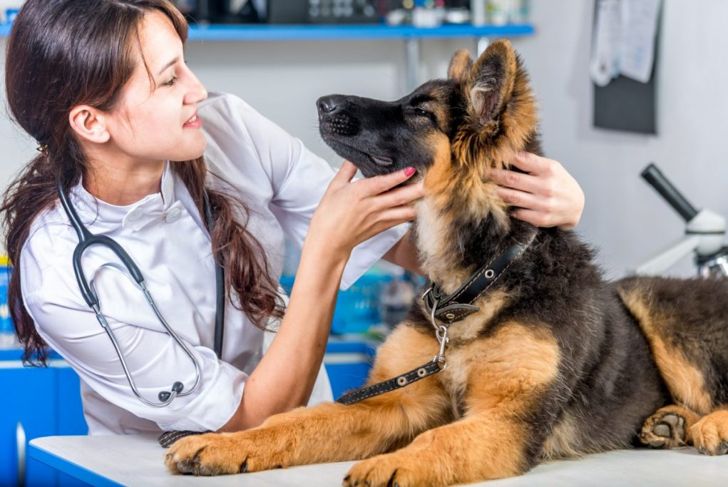There are few things cuter than watching an adorable dog tilt its head back and forth as it listens to an odd sound or waits for a tasty treat. If you think about it, though, it’s rather strange behavior. Dogs tilt their heads in all kinds of situations, and sometimes the reason may not even be obvious. Veterinarians and animal behaviorists aren’t completely sure about the reasons behind it, but there are some common theories about why dogs tilt their heads.
Better Vision
One theory is that dogs tilt their heads to see things better. Most dogs do have pretty good eyesight, but their long muzzles block part of their field of vision. Some experts believe that they tilt their heads to get a more complete view of certain objects, particularly when they’re looking down at something on the ground.
Better Hearing
Dogs have exceptional hearing, and their movable ear flaps let them quickly pinpoint the location of most sounds. This three-dimensional auditory perception helps them do things like pinpoint prey hiding under vegetation and determine where intruders are approaching from, but sometimes they may have trouble figuring out exactly where a sound is originating. Tilting their head back and forth may help them get a better fix on the source of the sound as their brain processes the information from each ear differently.
Being Rewarded
This probably isn’t the original reason dogs tilt their heads, but part of the reason some dogs do it so often may be that people find it so cute. Many owners reward their dogs for adorably tilting their heads by providing them with attention or treats, which may make the dogs more likely to do it in the future. Some people even train their dogs to do it on cue.
Showing Confusion
Some behaviorists believe that head tilting may just be an unconscious quirk that dogs show when they’re confused or concentrating hard on something. Many humans have similar quirks, such as sticking out their tongues. Some people even tilt their own heads, just like dogs do. There may not be much of a reason behind it besides habit.
Communicating Concern
Scientists used to debate about whether dogs have emotions, but modern scientific advances have shown that they do. Brain scans show that they release oxytocin, known colloquially as the love hormone when they see their owners, and they often engage in comforting behaviors when their owners are upset or distressed. Some behaviorists believe that dogs may tilt their heads to show a non-threatening, comforting interest in their owners when the owners are ill or upset.
Signaling Curiosity
Dogs are social animals, and they primarily use body language to communicate with people and other dogs. Some experts believe that head tilting may have developed as a way to use body language to show that there’s something interesting nearby that the rest of the pack may need to investigate. This can help signal everything from nearby prey animals to potential threats.
Ear Problems
Although most head tilting is benign, sometimes it can be a symptom of certain medical problems. In younger dogs, one of the most common problems is irritation in the ear itself. This can be due to a foreign body, such as a burr, that is stuck in the skin. Some dogs will also do it if they have water in their ear, although that usually resolves itself quickly. Ear infections or painful injuries can also cause dogs to hold their heads at an angle. This type of head tilting is usually accompanied by head shaking or ear scratching.
Vestibular Disease
Persistent head tilting can be caused by a condition called vestibular disease. This is a blanket term for a variety of conditions that affect the structures in the inner ear and brain that control a dog’s balance. Idiopathic vestibular disease is a type that has no apparent cause, and it is somewhat common in older dogs. Symptoms often lessen or resolve completely with a few days of supportive care. Vestibular disease in younger dogs is usually caused by tumors, injury, or disease.
Neurological Illness and Injury
A tilted head position can also be a symptom of other types of neurological damage. Dogs with distemper, a viral disease that attacks the nervous system, may move with a tilted head and unusual gait. Epileptic dogs may hold their heads in unusual positions during certain types of seizures, and brain injuries or tumors may cause a dog to tilt its head. These types of conditions usually involve the dog holding its head unevenly for fairly long periods of time and typically come with other symptoms.
Dental Problems
If you’ve ever had a painful cavity or broken tooth, you know how painful it can be. Dogs are prone to the same types of dental problems people get, but often have few ways to communicate it. Some dogs with a painful tooth on one side of their mouths will tilt their head in an effort to protect the tooth and lessen the pain. This may be accompanied by an unwillingness to eat or chew on toys or treats, as well as physical signs such as bad breath or visible damage to the tooth.

 Home
Home Health
Health Diet & Nutrition
Diet & Nutrition Living Well
Living Well More
More




















